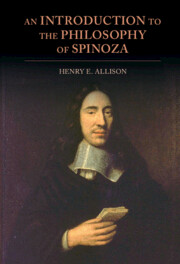Book contents
- An Introduction to the Philosophy of Spinoza
- An Introduction to the Philosophy of Spinoza
- Copyright page
- Contents
- Preface
- Acknowledgments
- Note on the Text
- Abbreviations
- Chapter 1 The Life of Spinoza
- Chapter 2 Spinoza’s Philosophy in Its Historical Context
- Chapter 3 God
- Chapter 4 The Human Mind
- Chapter 5 The Human Emotions
- Chapter 6 Spinoza’s Virtue Ethic
- Chapter 7 Freedom and Blessedness
- Chapter 8 The Individual and the State
- Chapter 9 The Theology of the Theological-Political Treatise
- Bibliography
- Index
Chapter 8 - The Individual and the State
Published online by Cambridge University Press: 24 February 2022
- An Introduction to the Philosophy of Spinoza
- An Introduction to the Philosophy of Spinoza
- Copyright page
- Contents
- Preface
- Acknowledgments
- Note on the Text
- Abbreviations
- Chapter 1 The Life of Spinoza
- Chapter 2 Spinoza’s Philosophy in Its Historical Context
- Chapter 3 God
- Chapter 4 The Human Mind
- Chapter 5 The Human Emotions
- Chapter 6 Spinoza’s Virtue Ethic
- Chapter 7 Freedom and Blessedness
- Chapter 8 The Individual and the State
- Chapter 9 The Theology of the Theological-Political Treatise
- Bibliography
- Index
Summary
We have learned from the Ethics that, despite their conatus or fundamental drive for self-preservation, human beings for Spinoza are essentially social animals, and, as such, they can achieve, peace, security, and freedom (as autocracy) only in association with others. We have also learned, however, that these same human beings are, at best, imperfectly rational. Indeed, according to Spinoza, the great majority of them are hardly rational at all, since they are governed by their passions rather than reason, which entails that they cannot live in society with one another unless they are subjected to a common set of laws and a sovereign power to enforce them. Human society, in other words, is possible only in a state. But the problem is that, inasmuch as this subjection presupposes a high degree of socialization, this seems to preclude the possibility of achieving the very freedom that requires socialization.
- Type
- Chapter
- Information
- An Introduction to the Philosophy of Spinoza , pp. 203 - 232Publisher: Cambridge University PressPrint publication year: 2022

